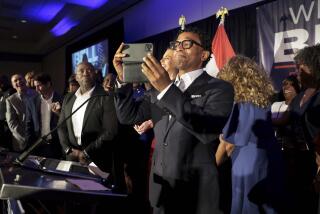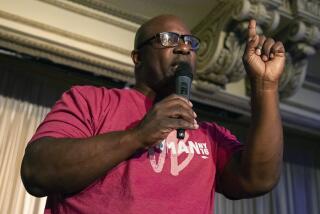Gramm Upset by Buchanan in Louisiana
- Share via
BATON ROUGE, La. — Patrick J. Buchanan got the official Republican presidential campaign off to an astounding start Tuesday by defeating Sen. Phil Gramm of Texas in Louisiana’s caucuses--an arena that Gramm, himself, had fashioned in the hopes of jump-starting his own campaign.
The victory allows Buchanan to present himself as the preeminent conservative challenger to the current front-runners, magazine publisher Steve Forbes and Sen. Bob Dole of Kansas.
As for Gramm, the defeat was a devastating--perhaps fatal--blow to a candidacy that had once seemed rich in promise. Just a week ago, campaigning in the state, Gramm said: “To become president of the United States, I have to win here in Louisiana.”
Indeed, Gramm and his allies had largely created the state’s contest and engineered its move to the head of the election calendar in the hopes of providing him an early win in the state next door to his own Texas. Until recently, Gramm and his aides had talked of sweeping all 21 of the state’s delegates, boosting the stakes here far out of proportion to the relatively small number of people who actually voted--about 21,500, according to an Associated Press vote count, or less than 6% of the state’s registered Republicans.
In the last several days, Gramm and his aides backed off their prediction of a sweep, but still insisted they would win. Even as Louisiana voters started heading to the polls Tuesday afternoon, Gramm said he would be dismayed if he received as few as 11 of the state’s 21 delegates.
“Eleven to 10 would still be victory, but it would be an awful lot like kissing your sister,” he said. “Now I’ve never had a sister, but I’m told it’s not exciting. So one of us is going to be disappointed.”
That one turned out to be Gramm. In the end, he won only eight delegates with Buchanan taking the remaining 13. Under the state’s caucus process, voters cast ballots for convention delegates, rather than for the candidates themselves.
The other main candidates in the race--Dole, Forbes and former Tennessee Gov. Lamar Alexander--stayed out of Louisiana, largely out of deference to the sentiments of Republicans in Iowa, who jealously guard their role as holders of the first contest in the race--scheduled for Monday.
In a victory statement here, Buchanan declared his triumph a victory for “faith, family and country” and for a “new conservatism of the heart” that he said embraced both unborn children imperiled by abortion and workers imperiled by unfair trade agreements.
The statement neatly summarized Buchanan’s attempt to combine social conservatism on issues such as abortion and gun control with a populist opposition to corporate interests on issues like trade.
For his part, Gramm said: “This is round one of a long race. This is a marathon, not a sprint.”
Rep. Joe L. Barton (R-Texas), a congressional ally, told reporters Gramm was “in it for the long haul.”
“I’m not putting a happy face on this,” he added. “We wanted to do better.”
Buchanan’s social conservatism clearly helped him here. According to an exit poll of 1,394 caucus-goers conducted by the Voter News Service for ABC, CBS, CNN and NBC and the Associated Press, nearly six in 10 of those who turned out for the caucuses said the Republican Party platform should support a constitutional amendment banning all abortions. Two-thirds of that group backed Buchanan.
Gramm beat Buchanan among those voters who said that their top priority was picking the candidate most likely to beat President Clinton in November. Unfortunately for Gramm, only 15% of those surveyed said that electability was their top priority.
Fifty-four percent of those polled said the most important factor when casting their ballot was their candidate’s conservative values. Among those voters, Buchanan beat Gramm 53% to 34%.
An endorsement from the state’s newly elected Republican governor, Mike Foster, also seems to have boosted Buchanan. “He was like a referee waiting until the match was almost over and then deciding who was the best man,” said Ray Fletcher, Buchanan’s media advisor here and an aide to Foster.
In his endorsement statement, Foster had cited the commentator’s opposition to abortion and gun control and his advocacy of ending lifetime appointments for federal judges and said that “I find that I agree with Pat Buchanan more” than with other candidates. Buchanan quickly turned the endorsement into a radio commercial.
In response, Gramm broke off his campaign in Iowa on Tuesday to fly to a series of stops in Lake Charles, Lafayette and Shreveport as the caucuses opened. In the meantime, the Texas senator shelled out cash he could ill afford to put a last minute commercial on the air extolling his achievements on Capitol Hill.
But it turned out to be too little and too late.
The process here put a premium on intense commitment. The Louisiana GOP provided only 42 polling places scattered across a state that stretches 380 miles from the Mississippi Delta to the Texas and Arkansas state lines, and voting was limited to only four hours--4 p.m to 8 p.m. CST.
Most analysts thought those restrictions would help Gramm because his forces were better organized. At Robert E. Lee High School here, for example, which was supposed to accommodate voters from three congressional districts and 43 precincts, Gramm signs outnumbered Buchanan’s by nearly 10 to 1.
Inside the school gym, where voting booths were set up, those in line could see and hear Gramm making his pitch for their support on no fewer than three television monitors. Nearby was a table stacked with Buchanan literature and one video monitor on the table was dark and silent.
But those factors meant little to Edith Drew, a housewife, mother of five and grandmother of nine. She backed Buchanan because in an election against Clinton, she said, he would be able to draw on “a wider spectrum of support” than Gramm--conservative Christians because of his opposition to abortion and his positions on other social issues and also erstwhile Perot voters, based on his opposition to NAFTA and militance on other trade issues.
Buchanan’s victory reverberated throughout the national political establishment. Gramm’s rivals were quick to jump on his embarrassment. Gramm’s campaign “was boiled and peeled like a Louisiana crawfish,” gloated Dole’s spokesman, Nelson Warfield.
Republicans were not the only ones surprised. Shortly after the first returns began coming in, Bob Courtney, a public relations aide to the state Republican Party, received a telephone call from Louisiana native and Democratic consultant James Carville. Courtney said Carville told him that his wife, former Republican consultant Mary Matalin had been watching television and heard that Buchanan was defeating Gramm.
“What the hell is going on there?” Carville asked.
“Just keep watching,” Courtney told him.
(BEGIN TEXT OF INFOBOX / INFOGRAPHIC)
Louisiana Results
Results from the Louisiana caucuses, where only two of the main Republican contenders campaigned.
Phil Gramm
% of vote: 38%
Delegates: 8
****
Patrick J. Buchanan
% of vote: 62%
Delegates: 13
More to Read
Get the L.A. Times Politics newsletter
Deeply reported insights into legislation, politics and policy from Sacramento, Washington and beyond. In your inbox twice per week.
You may occasionally receive promotional content from the Los Angeles Times.









